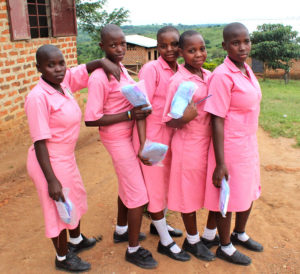
Girls with reusable menstrual pads in Uganda, another country where access to menstrual products is an issue. Photo credit: Amy Fallon/NPR.
Last week, Kenyan government officials announced a program to distribute free sanitary pads to the 4.2 million girls currently enrolled in public school. As part of an initiative to increase access to education for girls, the government will hand out 140 million sanitary pads over the next few months. According to Kenyan nonprofit ZanaAfrica, one million girls in Kenya miss school because they lack access to menstrual supplies. The country began setting aside funds for this program in 2011 to supply girls from disadvantaged backgrounds.
Principal Secretary of the Ministry of Public Service, Gender, and Youth Affairs, Safina Kwekwe Sungu, said the program would encourage girls to continue with school because they will have access to the menstrual resources that they need. She also continued her announcement by calling for an end to female genital mutilation in Kenya. She said that FGM should be categorized as a human rights abuse and that the practice leads to school dropouts and early marriages, which in turn impede development and limit girls’ potential. Sungu called on religious and community leaders to condemn the practice.
Access to proper menstrual hygiene products isn’t just a problem in Kenya, however. It is a problem around the world, and despite what some might think, it is political. In addition to sanitary pads, there is also the issue of access to proper toilets and water, which can sometimes be overlooked.
Education can open doors for so many people; if girls don’t have access to or are held back in their educational pursuits and that limits their further opportunities, then how can they be properly represented in government and politics, and all parts of life? Menstruation can be challenging to deal with in the best of circumstances, and I can’t imagine not being able to go to school or participate in daily life because of lack of access to the necessary supplies. The personal is political, and in this case, I’m very much hoping the Kenyan government follows through with their promises and that more governments around the world follow suit.
-Sage Daugherty
Associate Editor
Girl Museum Inc.
